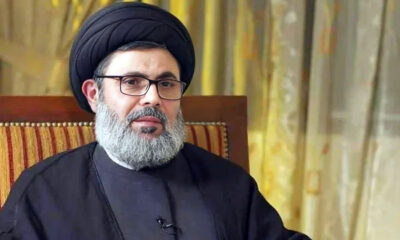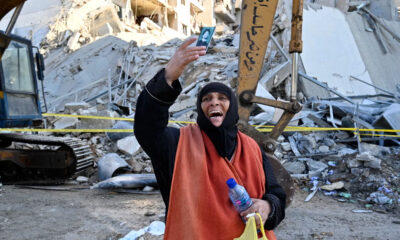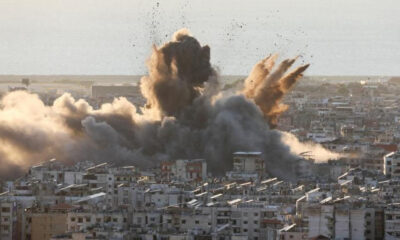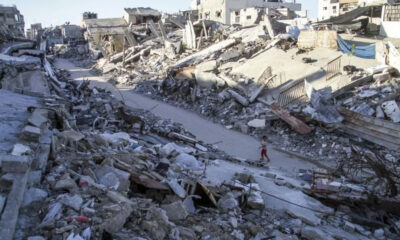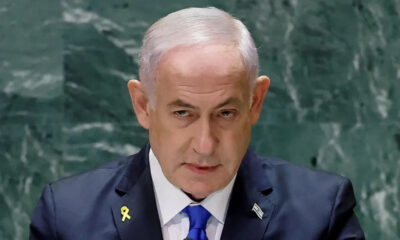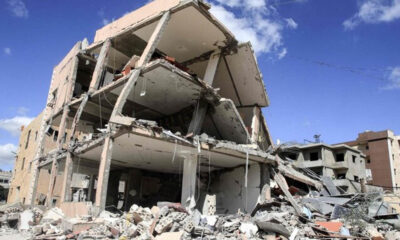International
Netanyahu: Israeli forces will move to Lebanon border as Rafah winds down
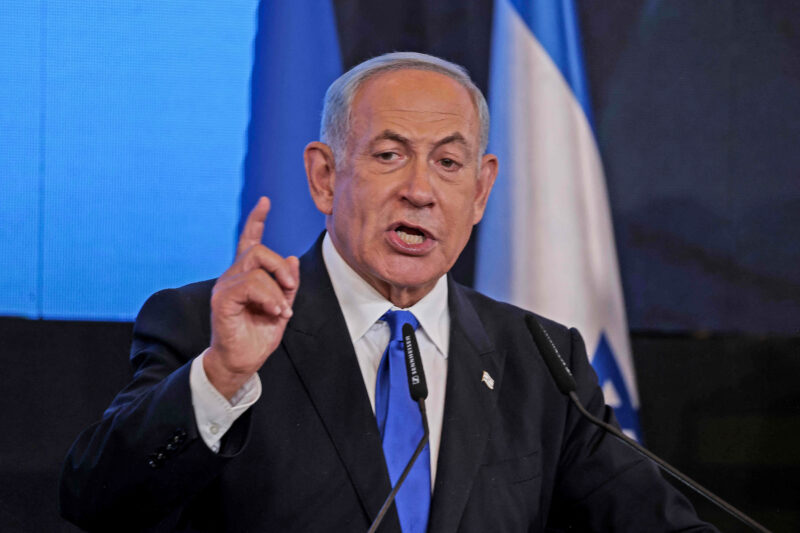
Netanyahu: Israeli forces will move to Lebanon border as Rafah winds down
Israel’s prime minister has said the “intense phase” of fighting Hamas in Gaza is nearly over, allowing forces to move to the northern border with Lebanon to confront its ally Hezbollah.
In his first Israeli media interview since the start of the war in October, Benjamin Netanyahu said he expected the ground operation in the southern Gaza city of Rafah to be completed soon.
But he stressed that “doesn’t mean the war is about to end”, with action continuing until Hamas was completely driven from power.
Addressing the escalating hostilities with Hezbollah, which have raised fears of a wider regional war, he said: ″We can fight on several fronts and we are prepared to do that.”
Hezbollah has been launching missiles, rockets and drones into northern Israel in support of Hamas since the day after the 7 October attacks in southern Israel, when gunmen from Gaza killed about 1,200 people and took 251 others as hostages.
More than 37,620 people have been killed in Gaza during the military campaign that Israel launched in response, according to the Palestinian territory’s Hamas-run health ministry.
Mr Netanyahu suggested in his interview with Israeli Channel 14 TV on Sunday that the seven-week Israeli operation in Rafah – which has displaced more than a million Palestinians – would be the last major offensive of the war.
“The intense phase of the fighting against Hamas is about to end,” he said. “It doesn’t mean that the war is about to end, but the war in its intense phase is about to end in Rafah.”
Israeli forces would “continue mowing the grass all the time”, he added. “We will not give up.”
READ ALSO:
- Five killed, dozens injured in Russian missile attack on Ukraine’s Pokrovsk
- Cleaner bags life jail for sexually assaulting baby in church
- Wikileaks founder Julian Assange to leave prison after US plea deal
Mr Netanyahu also said he was ready for a “partial deal” that would secure the release of the remaining 116 hostages still in captivity – 41 of whom are presumed dead – but that he was committed to completing “the goal of destroying Hamas”.
Hamas, which is demanding a permanent ceasefire and full Israeli withdrawal as part of any deal, said the comment showed the prime minister’s “clear rejection” of the proposal outlined last month by US President Joe Biden and backed by the UN Security Council.
The first phase of the plan – which Mr Biden said had been put forward by Israel – would last six weeks and include a temporary ceasefire that would see the release of some of the hostages. The second phase would see all the other living hostages freed during a “permanent cessation of hostilities”, with the latter subject to further negotiations.
In a speech at Israel’s parliament on Monday, Mr Netanyahu said his “position has not changed” and that he remained “committed to the Israeli proposal welcomed by President Biden”.
Later, the Hostages and Missing Families Forum released graphic video footage, filmed by Hamas gunmen, showing the abduction on 7 October of three of the remaining hostages – Hersh Goldberg-Polin, 23, Or Levy, 33, and Eliya Cohen, 26.
“We must approve and implement an agreement that will bring all hostages home – the living for rehabilitation and the murdered for proper burial!” the forum said.
Hamas also condemned the reported killing on Sunday of eight people in an Israeli air strike on a vocational college in Gaza City run by the UN Palestinian refugee agency, Unrwa, which was being used as an aid distribution point. The Israel Defense Forces (IDF) said buildings were being used for military purposes by Hamas, which the group rejected as a “lie”.
The IDF announced on Monday that it had killed a Hamas commander responsible for projects and development at the group’s weapons manufacturing headquarters in an overnight air strike, without giving a location.
It also said troops were continuing to carry out raids in the Rafah area, and that they had located weapons, dismantled several underground tunnel shafts and eliminated “a number of armed terrorists”.
According to the IDF, chief of staff Lt Gen Herzi Halevi told troops in Rafah: “We are clearly approaching the point where we can say we have dismantled the Rafah Brigade, that it is defeated not in the sense that there are no more terrorists, but in the sense that it can no longer function as a fighting unit.”
Mr Netanyahu said that once the current phase of the Gaza war was over, Israeli forces would “face north”.
He stated that the redeployment of troops to the border with Lebanon would be “first and foremost for defensive purposes”, but that it would also allow tens of thousands of Israelis displaced by Hezbollah rocket and missile attacks to return home.
“If we can, we will do this diplomatically. If not, we will do it in another way. But we will bring all [the residents] home.”
Israel wants Hezbollah to agree to withdraw its fighters several kilometres back from the border, in line with a UN Security Council resolution passed at the end of their war in 2006. However, Hezbollah says there will be no ceasefire agreement before there is one in Gaza.
READ ALSO:
- Security: FAAN sends armed special force to five airports
- Missing Ogun pregnant woman found in Kwara, faked kidnap – Police
- Napoli plans to slash asking price for Victor Osimhen
In addition to forcing tens of thousands of residents in northern Israel to flee their homes, Hezbollah’s attacks have so far killed at least 25 people in Israel. The IDF has responded with air and artillery strikes in Lebanon, which the UN says have reportedly killed more than 400 people and displaced tens of thousands.
The cross-border exchanges have been intensifying in recent weeks, along with threats from both sides.
On Monday, the IDF said fighter jets had struck a number of Hezbollah “terror targets” in southern Lebanon overnight, including a military structure in Aitaroun and infrastructure in Kfarkela and Khiam.
Lebanon’s state-run National News Agency said there had been an air strike on a house in Aitaroun and that no casualties were reported.
The IDF also said two Israeli reservists in a local security team had been injured, one seriously, by a Hezbollah anti-tank missile attack in the Israeli border town of Metula on Sunday night.
On Sunday, the chairman of the US military’s joint chiefs of staff warned that an Israeli offensive in Lebanon could “drive up the potential for a broader conflict” that draws in Iran and other Iran-backed groups.
“Hezbollah is more capable than Hamas as far as overall capability, number rockets and the like. And I would just say I would see Iran be more inclined to provide greater support to Hezbollah,” General CQ Brown told reporters.
He also said it would be “harder” for the US to defend Israel from attacks by Hezbollah than it was during Iran’s attack on Israel in April, when almost all of the drones and missiles it launched were intercepted.
His remarks came as Israeli Defence Minister Yoav Gallant visited Washington to discuss the next phase of the Gaza war and Hezbollah. Before leaving, Mr Gallant said Israel was “prepared for any action that may be required in Gaza, Lebanon, and in more areas”.
Last week, the IDF confirmed that operational plans for an offensive against Hezbollah had been approved and Foreign Minister Israel Katz warned that Hezbollah would be destroyed “in an all-out war”.
Hezbollah’s leader, Hassan Nasrallah, said it was not interested in a full-scale conflict, but that if one breaks out “there will be no place safe” in Israel.
UN Secretary General Antonio Guterres said people in the region could “not afford Lebanon to become another Gaza”.
Netanyahu: Israeli forces will move to Lebanon border as Rafah winds down
BBC
International
Israel confirms killing Safieddine, likely successor to slain Hezbollah’s Nasrallah
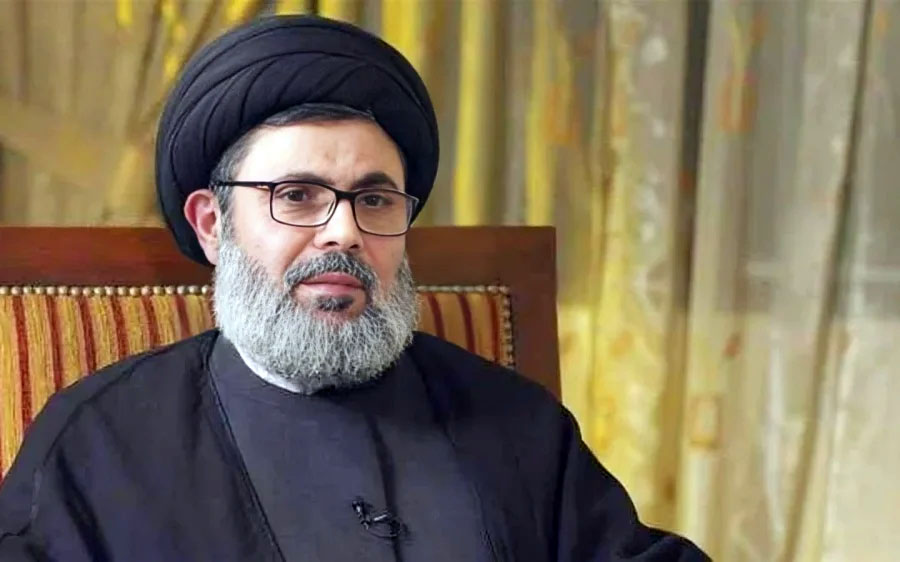
Israel confirms killing Safieddine, likely successor to slain Hezbollah’s Nasrallah
JERUSALEM: Israel’s army confirmed Tuesday it “eliminated” Hezbollah’s Hashem Safieddine, apparent successor of slain leader Hassan Nasrallah, in a strike in a southern Beirut suburb three weeks ago.
“It can now be confirmed that in an attack approximately three weeks ago, Hashem Safieddine, the head of Hezbollah’s Executive Council, and Ali Hussein Hazima, the head of Hezbollah’s Intelligence Directorate, were killed along with other Hezbollah commanders,” the army said in a statement.
Hezbollah has not yet issued a statement regarding the claim.
On October 8, Israeli Prime Minister Benjamin Netanyahu said that the military has “taken out” Safieddine, without specifically naming him.
In an address to the people of Lebanon, Netanyahu said Israeli forces “took out thousands of terrorists, including (Hezbollah leader Hassan) Nasrallah himself and Nasrallah’s replacement and the replacement of his replacement.”
Late on Tuesday, the army said that Israel’s air force “conducted a precise, intelligence-based strike on Hezbollah’s main intelligence headquarters,” in the southern Beirut suburb of Dahiyeh, Hezbollah’s stronghold in the Lebanese capital three weeks ago.
The statement added that over 25 Hezbollah militants were present in the headquarters during the strike, “including Bilal Saib Aish, who was in charge of aerial intelligence gathering.”
READ ALSO:
- Nigeria investigates Gulf of Guinea as major arms trafficking route – NSA
- You can’t overrule Supreme Court judgement on LG autonomy – AGF
- Fake fertility nurse arraigned in Enugu for defrauding 45 women
A member of Hezbollah’s decision-making body and a distant relative of Nasrallah, Safieddine was out of contact since Israeli strikes on Beirut weeks ago, a high-level Hezbollah source said at the time.
A source close to Hezbollah told AFP in early October that the deeply religious cleric Safieddine, who had good relations with Hezbollah backer Iran, was the “most likely” candidate for the party’s top job.
Grey-bearded and bespectacled, Safieddine bore a striking resemblance to his distant cousin Nasrallah, but was several years his junior, aged in his late 50s or early 60s.
“We have reached Nasrallah, his replacement and most of Hezbollah’s senior leadership,” the Israeli army’s chief Lt. Gen. Herzi Halevi said in a statement late on Tuesday after the confirmation of Safieddine’s death.
After nearly a year of war with Palestinian Islamist movement Hamas in Gaza, Israel shifted its focus to Lebanon in late September, vowing to secure its northern border threatened by cross-border fire from Hamas’s Lebanese ally Hezbollah.
Israel ramped up its air strikes on Hezbollah strongholds around the country and sent in ground troops late last month, in a war that has killed at least 1,552 people since September 23, according to an AFP tally of Lebanese health ministry figures.
The Israeli military issued new calls for residents to evacuate areas in the southern suburbs of capital Beirut on Tuesday evening, warning of imminent attacks.
In recent days the military has targeted Hezbollah’s financial assets across the country.
Hezbollah, meanwhile, has continued to fire rockets and missiles at Israel.
“As of 23:00 (2000 GMT), approximately 140 projectiles that were fired by the Hezbollah terrorist organization have crossed from Lebanon into Israel today,” the military said in a statement late on Tuesday.
Israel confirms killing Safieddine, likely successor to slain Hezbollah’s Nasrallah
ARAB NEWS
International
Trump accuses UK’s Labour Party of ‘foreign interference’
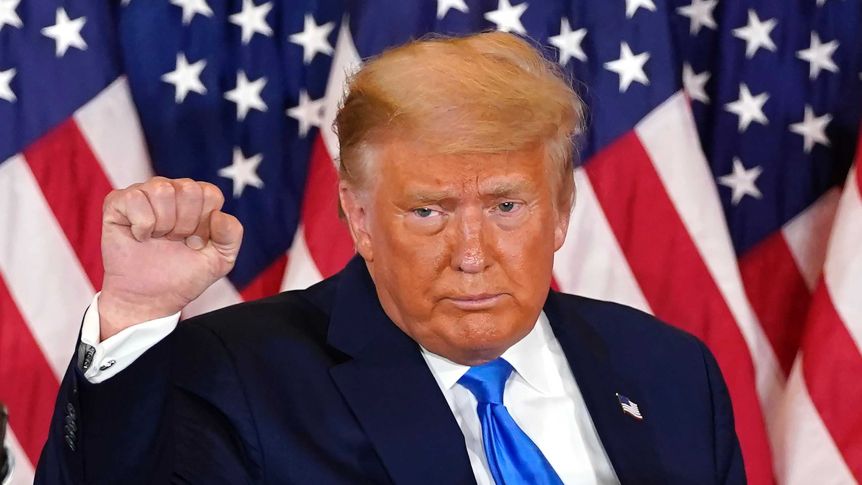
Trump accuses UK’s Labour Party of ‘foreign interference’
Donald Trump’s campaign has filed a Federal Election Commission (FEC) complaint against the UK’s Labour Party, accusing it of “blatant foreign interference” in the US election in aid of the Harris-Walz campaign.
The complaint cites media reports about contact between Labour and the Harris campaign as well as apparent volunteering efforts, arguing that this amounts to illegal “contributions”.
The BBC understands that Labour activists campaigning in the US presidential election are doing so in a personal capacity.
The Labour Party has not issued an official response.
Specifically, the complaint cites newspaper reporting that Labour-linked individuals have travelled to the US to campaign for Harris.
That reporting, the complaint alleges, creates a “reasonable inference that the Labour Party has made, and the Harris campaign has accepted, illegal foreign national contributions.”
The letter refers to Washington Post reporting that communications were exchanged between the parties and that senior officials have met in private.
Additionally, the complaint cites a social media post on LinkedIn in which a Labour staff member said that “nearly 100” current and former party members will be headed to battleground states in the US.
READ ALSO:
- Dangote’s $100m land deal: Judge, AG absence stalls court hearing
- Halima Abubakar slams AGN President with N30bn lawsuit
- Northern Nigeria suffers blackout as 330Kv circuit strips
The post, from Labour Party head of operations Sofia Patel, added that 10 “spots” are available and that “we will sort your housing”.
It appears to have since been deleted.
The complaint makes comparisons to an international programme in 2016 in which the Australian Labor Party, or ALP, sent delegates to help with Bernie Sanders’ campaign.
In that instance, however, the ALP paid for flights and daily stipends. The party and the campaign were each handed down civil penalties of $14,500.
Labour activists’ trips were not organised or funded by the party, it is understood from party officials.
Foreign nationals are permitted to serve as campaign volunteers as long as they are not compensated, according to FEC rules.
It is considered normal for party officials from the UK to be in contact with counterparts in the US.
It also has taken place previously between the UK’s Conservative Party and US Republicans.
The BBC has contacted the Harris-Walz campaign for comment.
Trump accuses UK’s Labour Party of ‘foreign interference’
BBC
International
Lebanon says four dead in Israeli strike near southern Beirut hospital
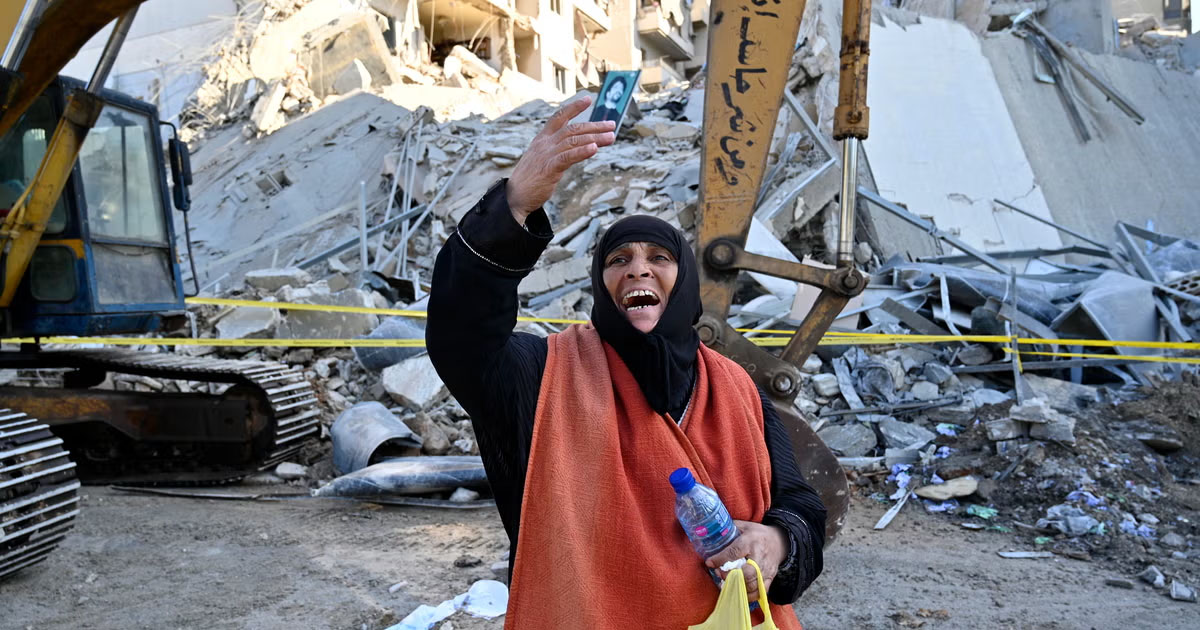
Lebanon says four dead in Israeli strike near southern Beirut hospital
Four people including a child have been killed in an Israeli air strike near the main government hospital in southern Beirut, the Lebanese health ministry says.
The strike appeared to hit the car park of the Rafik Hariri University Hospital, a hospital source told Reuters news agency. The health ministry said 24 people had been injured.
It was among 13 air strikes that hit south Beirut on Monday evening. The Israeli military said it was attacking facilities linked to Hezbollah.
An Israeli spokesman had earlier warned people to move away from several locations in southern Beirut, however Rafik Hariri hospital was not among the locations mentioned.
Videos from the Dahiyeh neighbourhood in southern Beirut, where seven locations to be targeted were announced in advance, showed locals fleeing in vehicles and on foot as the strikes began hitting.
One location identified as a target by the Israeli army was roughly 400m from Beirut airport, the only international airport serving Lebanon.
Local media shared images of some windows in an airport building that were blown in the blast.
Israel has not commented since issuing the earlier evacuation warnings.
Separately, the Israeli military said earlier on Monday that it had identified a Hezbollah bunker concealed under a different hospital in southern Beirut, which has since been evacuated.
IDF spokesman Rear Admiral Daniel Hagari said without providing evidence that the bunker under the Sahel hospital in Haret Hreik held hundreds of millions of dollars in cash and gold that was being used to fund Hezbollah’s attacks on Israel.
READ ALSO:
- Ex-president of Peru gets 20 years for corruption
- Hospitals under fire as Israeli forces deepen operations in northern Gaza
- UN chief condemns killings of civilians in Gaza
The director of Sahel hospital denied there was a bunker underneath it and called on the Lebanese army to inspect the site.
Israel appears to have expanded its war against Hezbollah beyond military infrastructure and says it is targeting the group’s financial networks.
On Sunday night Israel carried out air strikes targeting branches of a financial association linked with Hezbollah in the southern suburbs of Lebanon’s capital Beirut, as well as the south and east of the country.
The Israeli military said it targeted money held by Al-Qard Al-Hassan Association (AQAH). It offers financial services to civilians in areas where Hezbollah has strong support, but Israel and the US accuse it of being a cover for the Iran-backed group to fund its activities.
There was no immediate comment from AQAH or Hezbollah.
Also on Monday, US President Joe Biden’s special envoy to the Middle East arrived in Beirut to explore the possibility of a negotiated end to the war.
Amos Hochstein said the US wanted to see an end to the war in Lebanon end “as soon as possible”.
He said that UN resolution 1701 – which calls for the Lebanese state to be the only armed force in southern Lebanon – was “not enough” and the US was looking into what more needed to be done.
Hezbollah fighters meanwhile continued to fire rockets into northern Israel, with the military reporting that 170 projectiles had crossed the border by late Monday evening.
Israel began an intense air campaign and ground invasion against Hezbollah after almost a year of cross-border fighting sparked by the war in Gaza, saying it wanted to ensure the safe return of tens of thousands of residents of Israeli border areas displaced by rocket attacks.
Hezbollah began firing rockets into northern Israel in support of Palestinians on 8 October 2023, the day after its ally Hamas’s deadly attack on Israel.
More than 2,400 people have been killed in Lebanon since then, including 1,800 in the past five weeks, according to the country’s health ministry. Israeli authorities say 59 people have been killed in northern Israel and the occupied Golan Heights.
Lebanon says four dead in Israeli strike near southern Beirut hospital
BBC
-

 News2 days ago
News2 days agoFIRS announces recruitment of young graduates
-
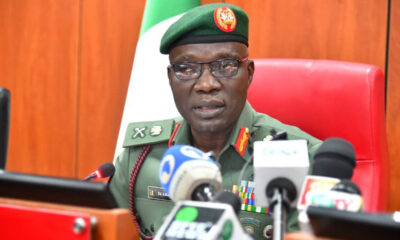
 metro3 days ago
metro3 days agoUpdated: Army says reports of COAS Lagbaja’s death fake news
-

 metro2 days ago
metro2 days agoOluwo chased me out when I visited him – Ooni (VIDEO)
-

 News2 days ago
News2 days agoOsinbajo traitor, can’t talk about integrity – Reno Omokri
-

 metro2 days ago
metro2 days agoFani-Kayode: How my aide died in hotel after attending church
-

 Business1 day ago
Business1 day agoWe’re settling out of court with NNPC, others — Dangote
-

 metro2 days ago
metro2 days agoBREAKING : DSS replaces Tinubu’s chief security officer
-

 News2 days ago
News2 days agoYou can’t overrule Supreme Court on LG autonomy – Klinsmann tells Soludo

